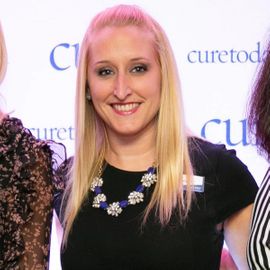- About Us
- Advertise / Support
- Editorial Board
- Contact Us
- CancerNetwork.com
- TargetedOnc.com
- OncLive.com
- OncNursingNews.com
- Terms & Conditions
- Privacy
- Do Not Sell My Information
- Washington My Health My Data
© 2025 MJH Life Sciences™ and CURE - Oncology & Cancer News for Patients & Caregivers. All rights reserved.
23andMe Test Opens Conversations, Highlights Need for Genetic Counselors

Kristie L. Kahl is vice president of content at MJH Life Sciences, overseeing CURE®, CancerNetwork®, the journal ONCOLOGY, Targeted Oncology, and Urology Times®. She has been with the company since November 2017.
Albeit growing popularity of at-home genetic testing, it is still necessary to seek professional medical opinions from genetic counselors to help discuss results.
While at-home genetic testing becomes more popular, given its convenience and low cost, individuals must still ensure they have access to proper resources and genetic counselors to offer clear advice after getting their results.
In March, the Food and Drug Administration (FDA) authorized the first direct-to-consumer test, 23andMe, designed to report on three specific BRCA1/BRCA2 gene mutations.
The Personal Genome Service Genetic Health Risk (GHR) Report analyzes DNA collected from a self-collected saliva sample. The report then describes if a woman is at an increased risk for developing breast and ovarian cancer, and if a man is at an increased risk for developing breast or prostate cancer.
However, this report is not without its caveats.
Main Concerns
The test — which reports on the mutations that are most common in people of Ashkenazi Jewish descent – only detects three out of more than 1,000 known BRCA mutations, meaning a negative result does not rule out the possibility that an individual still carries other BRCA mutations that may increase risk for cancer.
“The 23andMe testing for the BRCA mutations include the three most common mutations that occur in people of Eastern European or Ashkenazi Jewish descent,” Whitney Ducaine, MGC, CGC, CN-BM, director of cancer genetics services at InformedDNA, said in an interview with CURE.
“Think of these three mutations like hot spots within the genes that are extremely common in that ethnicity. So, the test can be very helpful for that population, but it is not useful and doesn’t give answers for non-Jewish individuals trying to find out (if they carry the BRCA mutation).”
Along with the authorization, the FDA also warned that consumers and health care professionals should not use the test results to determine any treatments, including anti-hormone therapies and prophylactic removal of the breasts or ovaries.
“Because it’s not a test that should be used to make medical decisions, anyone that tests positive on the 23andMe test, you should be retested in the setting of a clinical laboratory where that information can be used for medical decision making,” added Ducaine.
The agency also recommended confirmatory testing and genetic counseling still be required in these instances.
“(Genetic counselors) want any testing to be done to benefit patients and not cause harm — whether that is mental, emotion, physical harm – we really want to make sure that the testing is going to help them even if it’s not always good news,” said Ducaine.
Genetic Counselors
As a result, the role of genetic counselors — designed to help identify if there is something genetic in a family and what that may mean for someone – are just as important now, more than ever before.
“Genetic counselors are a part of the health care team, specifically trained in medical genetics and psychology — so it is kind of a mixture of being able to explain things in laymen’s terms while also addressing the emotional or difficult components that come up,” said Ducaine.
No matter which type of genetic testing an individual seeks, the overall importance of the testing is universal throughout. “Genetic testing can really help to identify who is at increased risk for various disease or conditions, and if someone does have a higher risk than the general population,” explained Ducaine.
“The goal is to help do better screening, offer medical management recommendations that may be tailored (to individual patients); it is kind of personalized health care at its best.”
Similarly, all genetic tests have one common limitation: It is lot more complicated than it used to be because there are hundreds of different genes that can be related to various cancers running in families, explained Ducaine.
Despite its individual limitations, the 23andMe test is essential for individuals for one main reason: it is a conversation starter.
“This is huge for just getting the door open,” said Ducaine. “I think any publicity about genetic testing and getting people to start questioning, ‘Maybe I should ask about that aunt that had breast cancer that I forgot about. Does that matter to me?’ is helping to keep that conversation front and center, engaging the public in this discussion.”
“The other is it is increasing access to tests,” she added. “So, by making it very easy to do, it’s not ordered through your doctor’s office, you don’t have to wait to go in to see your doctor, it just makes the testing a whole lot easier for that specific test.”
Lastly, in addition to patients advocating for themselves, Ducaine noted it is equally important for health care teams to also spark the discussion of genetic testing with their patients.
“Nurses and other members of the health care team can really help. If they are the ones the patients see every year, if they recommend genetic testing or speaking to a genetics expert, then a lot of times patients will respect that opinion and think a little more about following up on that. They really value the opinion of their health care provider, so nurses and providers play an integral role in helping patients know why this is so important.”
Related Content:



